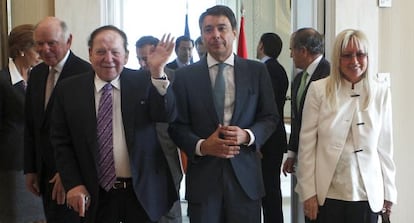Eurovegas stays shrouded in smoke
Doubts over whether smoking will be allowed in the casino complex have unleashed hostilities between PP officials in the Madrid and central governments

The first bricks of Eurovegas were due to be laid this December — January of next year at the very latest. Moving the earth and other preliminary tasks for building the mega-casino and conference center project would generate, to begin with, 10,000 jobs in construction and other associated industries. Of the 15,000 unemployed people in Alcorcón, the Madrid suburb chosen by developer Las Vegas Sands for its first project in the European Union, 4,000 fit this profile.
Expectation over the employment possibilities that the project would create in a country where over one in four is out of a job reached such levels that the Popular Party (PP) group in the nearby dormitory town of Parla carried out a campaign to collect resumes of those interested in obtaining one of the 250,000 direct, indirect and induced jobs promised on paper by the developer, while Parla's Socialist mayor, José Manuel Fraile, directly demanded: "Eurovegas for Parla."
Now with just three months to go before December, all the predictions are up in the air. What was reportedly going to be the biggest investment in the whole of Europe — 17 billion euros — "is now running the serious risk of going somewhere else," admits Madrid's PP regional premier Ignacio González.
Beyond the doubts surrounding the dizzying figures for Eurovegas and its financing, the main thing holding it back is the argument over whether national anti-smoking legislation should be relaxed for the development to allow visitors to light up in restricted spaces in Sheldon Adelson's casinos. Spanish law prohibits smoking in enclosed public spaces.
Eurovegas is now running the risk of going somewhere else"
The half-heartedness and ambiguity with which Prime Minister Mariano Rajoy's government has been treating such as a sensitive subject, and an especially thorny one for Health Minister Ana Mato, is behind the row that erupted in official form last week between the Madrid and the central governments - and by extension between the capital's arm of the PP, the most powerful in the country, and the party's national leadership.
The smoking law was never negotiable for Adelson. If one thing was clear to those who took part in the negotiations to snare Eurovegas over the past six years, it was that smoking would be legal there. Adelson wanted that to be the case before he invested a single euro. That was how the gambling magnate and majority shareholder in Las Vegas Sands put it when he first began conversations about the project with Miguel Sebastián, the industry minister in the second term of the former Socialist government of José Luis Rodríguez Zapatero. Former Madrid regional premier Esperanza Aguirre and her number two and successor, González, received the same message. Even the prime minister himself was able to hear it first hand at the two receptions he lavished on the US-Israeli Republican businessman at La Moncloa palace. "[Eurovegas] is a good project, we support it," Rajoy said.
But now the region is reproaching central government for its "slowness." By the third month of his premiership, González had already designed and passed a regulation to suit Adelson's project, coming up with a raft of discounts and fiscal exemptions that were criticized by the opposition as a "made-to-measure suit." Among them were the lowering of the maximum tax rate on gambling from 45 percent to a single levy of 10 percent and the subsidizing of the tax on transfers of assets for investments similar to those of Eurovegas to the tune of 95 percent.
A change of attitude from Mato, who broke her silence over Eurovegas last Wednesday and admitted she was looking for "formulas" to allow smoking in the casinos, has provided temporary respite. But it is too early to talk about a truce between the national and the Madrid PP governments, the latter of which was upset by Deputy Prime Minister Soraya Sáenz de Santamaría's suggestion that it present a legislative initiative requesting more permissive anti-smoking regulations.
The regional PP believes this is just an excuse to waylay the matter and says it would have presented one a year ago if such an idea had been "insinuated."
If one thing was clear to negotiators, it was that smoking would be legal there
In response to the criticism, Industry Minister José Manuel Soria told EL PAÍS in an interview published on Sunday that "all agreed commitments are going to be fulfilled." Soria's strategy is to put all the pressure on Las Vegas Sands. "The problem is that of financing," he says. "I don't know if they have found it. They are the ones who are looking for it."
Las Vegas Sands president Michael Leven has said on several occasions that the money "is assured." But despite the doubts of Soria, plus Deutsche Bank and JP Morgan analysts, in the Madrid region they are clinging on to the promises of the multinational. The firm needed to put in 2.7 billion euros from its own coffers to begin construction and from 2014 was due to add another four billion in financing.
Meanwhile, the uncertainty surrounding the project seems to increase as each week passes. The intention that the first of the three planned phases of the development, which once complete would include the highest skyscrapers in Spain, would be finished by 2017 with four hotels and one casino now sounds like a pipedream. At the same time, the owners of the 750 hectares on which it is set to be built, who range from life-long Alcorcón residents to big landowners such as Metrovacesa, have heard nothing since before the summer. "In March we feared that the region was going to expropriate us at a sale price. Now..." says one owner, who doesn't know whether to go on farming the land, or whether the region will buy the plots "badly" or come out of it poorly by selling them at "pre-crisis prices." As it waits for the politicians to clarify matters, Alcorcón North district remains a barren wasteland. And in the air remains a grandiloquent project that could ultimately come to nothing. Which is what it currently is.
Tu suscripción se está usando en otro dispositivo
¿Quieres añadir otro usuario a tu suscripción?
Si continúas leyendo en este dispositivo, no se podrá leer en el otro.
FlechaTu suscripción se está usando en otro dispositivo y solo puedes acceder a EL PAÍS desde un dispositivo a la vez.
Si quieres compartir tu cuenta, cambia tu suscripción a la modalidad Premium, así podrás añadir otro usuario. Cada uno accederá con su propia cuenta de email, lo que os permitirá personalizar vuestra experiencia en EL PAÍS.
¿Tienes una suscripción de empresa? Accede aquí para contratar más cuentas.
En el caso de no saber quién está usando tu cuenta, te recomendamos cambiar tu contraseña aquí.
Si decides continuar compartiendo tu cuenta, este mensaje se mostrará en tu dispositivo y en el de la otra persona que está usando tu cuenta de forma indefinida, afectando a tu experiencia de lectura. Puedes consultar aquí los términos y condiciones de la suscripción digital.









































